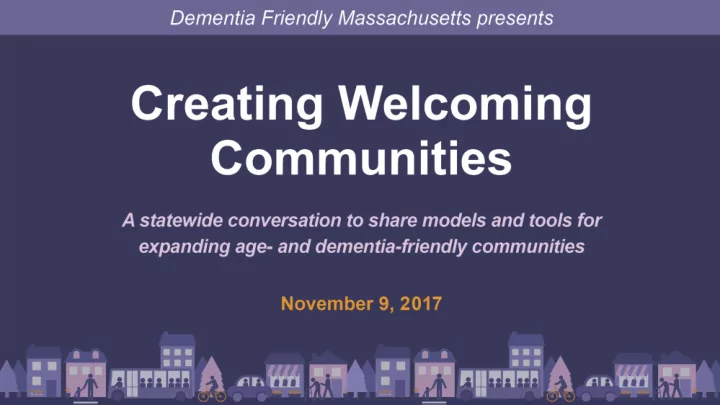

Responses to question on posterboards : “What Does a Dementia Friendly Community Look Like to You?” • Compassion • Advocates in the community to help protect those with dementia. “If you see something, say something.” • We all need to help people, so that no one is taken advantage of. • Include the person with dementia in the conversation. Don’t talk “about” them in front of them. • Informed about different conditions and symptoms • Slow down. For example, allow a longer period of time allowed to use machines, such as the Charlie Card machine. • Involve the younger generation and schools for sustainability over time; i.e., internships, volunteering, classes on prevention, intergenerational activities. • Loving • No prompts or robot messages when calling • People living with dementia and their care partners no longer feel a sense of stigma because of cognitive changes. • Patient • Open doors in traditionally locked Alzheimer’s units. • A community of compassionate, kind citizens who respect and support one another, regardless of individual variations. • Leaders working together to support folks living with dementia, and care partners, and not competing with other initiatives/movements.
Points from afternoon discussion (“Bringing it All Together”) • Promote kindness and patience • Promote accessibility beyond health care settings (restaurants, business, etc.) • Make information more visible and accessible • Prioritize advocacy for transportation as one of Dementia Friendly MA’s key messages • Infuse access, equity and cultural inclusion in our work • Develop support for, and inclusion of, teenagers and kids in our work • Create educational opportunities on dementia for children and teens • Work to reduce stigma and foster supportive environment for people to “come out” • Being dementia friendly is part of being a better person • Make a simplified dementia checklist available for businesses and other public spaces • Even small interactions with people outside of human services can have a big impact • “Care partner” is preferable to “care giver.” • Our work can reduce isolation for professionals as well as families • Develop our non-verbal communications skills • Leverage contributions and skills of people with dementia
More feedback from evaluations and comments • Wonderful to hear from people living with dementia. They need to be included on committees! • The information from the Access, Equity and Cultural Inclusion panels was so important. • We need to build flexible infrastructures, so communities can locally prioritize things. Face to face communication is at the heart of this infrastructure, making people feel not just welcome but at home. • Representation matters. Women do much of the heavy lifting, irrespective of the community. To those establishing program priorities and striving for inclusion - don't fake it, because the community can always tell. • There is a persistent theme of stigma (and an intersection of stigmas), safety and discrimination, erasure of cultural status. Most communities that face disparities needed to build or rely on a fictive kin structure (which is disadvantageous for legal or medical matters). There is a clear need for familiarity to feel safe, as many of these individuals must navigate a world they feel wasn't built for them and doesn't always see them. It is paramount to be respectful and engaging, but recognize differences for groups. Create an infrastructure that doesn’t require individuals to disclose their identities in order to take advantage of resources. • Transportation, transportation, transportation. Should Uber/Lyft drivers be trained? • Could we hear more via webinars, or regional gatherings? • More time needed; we wanted to go to all of the sessions!
Recommend
More recommend